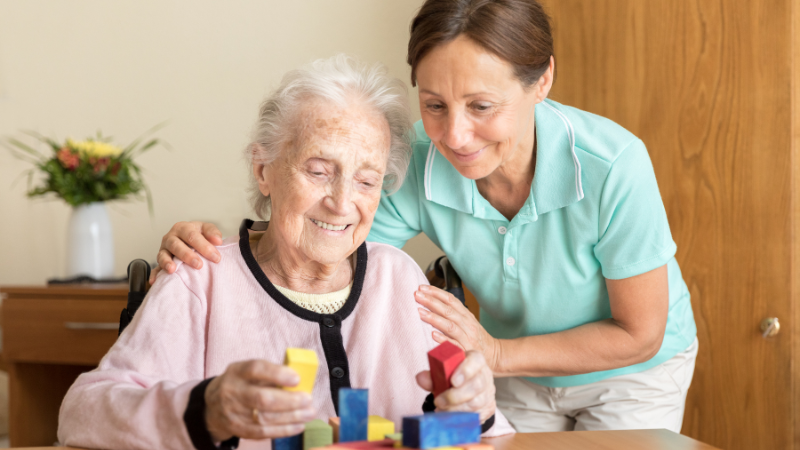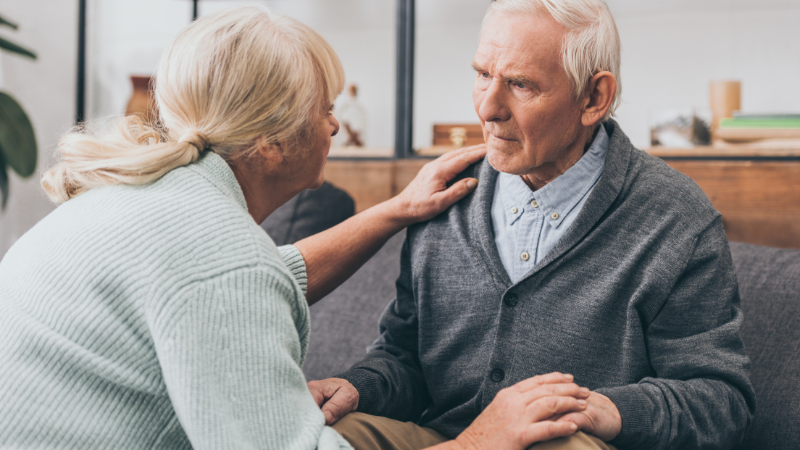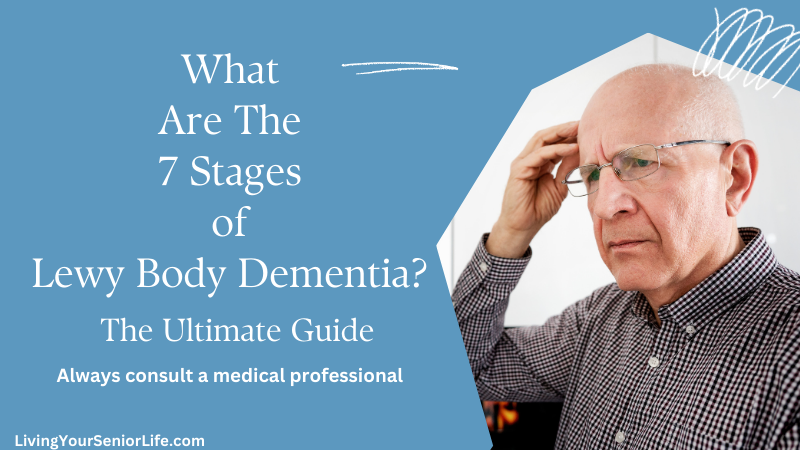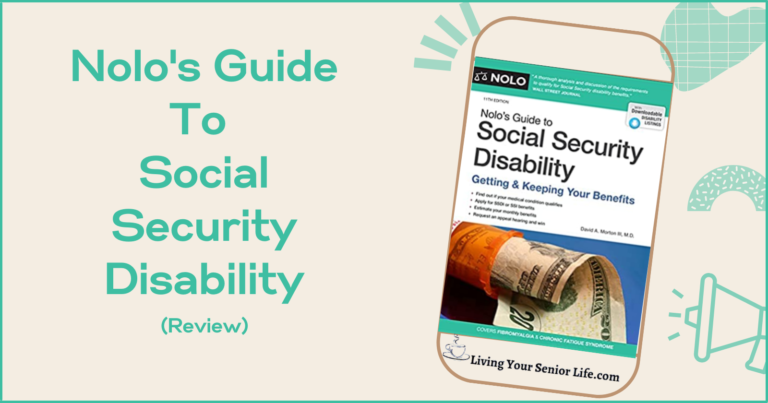This post is for informational purposes only and should not be used in place of the advice of a medical professional.
In the realm of neurodegenerative diseases, Lewy Body Dementia (LBD) stands as a complex and often misunderstood condition. Characterized by the accumulation of abnormal protein deposits in the brain, LBD progresses through distinct stages, each presenting unique challenges for both patients and caregivers. Understanding these stages is crucial for offering appropriate care and support throughout the journey. Join us as we delve into understanding what are the 7 stages of Lewy Body Dementia, shedding light on the symptoms, behaviors, and strategies for coping with this intricate condition.
Key Takeaways:
- LBD is marked by progressive cognitive and motor decline due to Lewy bodies in the brain.
- It consists of seven stages, from mild memory problems to severe dementia requiring 24-hour care.
- Early recognition of symptoms can aid in managing daily tasks and improving life quality.
Understanding Lewy Body Dementia
Lewy Body Dementia (LBD) is a progressive brain disorder that affects cognitive function, with symptoms that can often be mistaken for Alzheimer’s disease or Parkinson’s disease. Characterized by abnormal deposits of a protein known as Lewy bodies in the brain cells, LBD leads to a decline in mental abilities and motor skills. As one of the most common forms of dementia in the United States, it presents a complex challenge, both for individuals experiencing the condition and for their family members.
The progression of LBD typically spans seven stages, ranging from mild cognitive impairment to severe dementia. Recognizing the symptoms of Lewy Body Dementia, which can include subtle changes in mood or cognitive abilities, to more evident signs like severe cognitive decline or visual hallucinations, is key to an early diagnosis. As LBD symptoms progressively impact daily activities, from mild forgetfulness to the need for round-the-clock care, awareness can help in adapting to the needs of each stage and maintaining the best possible quality of life for those affected.
At any sign of memory issues, personality changes, or slow movement, consulting medical professionals for an accurate diagnosis, possibly involving a CT scan or MRI scan, becomes imperative.
7 Stages of Lewy Body Dementia
Stage 1: Mild cognitive impairment – During this early stage, mild memory loss and slight cognitive changes that are often mistaken as a normal part of aging might be experienced. Subtle personality changes might be noticeable and daily tasks could take a bit longer than usual.
Stage 2: Mild dementia – At this point, increased memory issues, particularly with recent events, and daily life might be encountered. Mild forgetfulness can become apparent to family members and friends.
Stage 3: Moderate dementia – Daily activities become more challenging for those effected and might require assistance. Cognitive symptoms like difficulty with complex tasks and personality changes are more evident.
Stage 4: Moderately severe cognitive decline – Significant memory loss is seen and help with daily activities may be required. Problems with movement, such as slow movement or risk of falls, can occur.
Stage 5: Severe dementia – Independent living becomes difficult, and 24-hour care may be necessary. Severe cognitive decline manifests in problems with speech and motor symptoms.
Stage 6: Very severe cognitive decline – Communication becomes minimal, and severe problems with cognitive function and motor function mean that constant care is needed for safety and well-being.
Stage 7: Late-stage dementia – In the final stage of LBD, complete reliance on others for personal care is needed and movement disorders might lead to being bedridden. Quality of life can be supported with comprehensive palliative care.
Early Stage: Mild Cognitive Impairment
In this early stage, Lewy bodies, abnormal deposits of a protein, may begin to interfere with brain cells. There may be forgetfulness that does not significantly disrupt daily life. This phase is akin to mild cognitive impairment (MCI), where slight cognitive changes in memory issues and cognitive function may appear. These subtle changes could include difficulty recalling past events or managing everyday tasks like meal preparation.
Family members may notice mild memory loss or mild forgetfulness, possibly mistaking them as a normal part of aging. Unlike Alzheimer’s disease, distinct early signs like REM sleep behavior disorder and visual hallucinations can occur. Managing daily activities may still be feasible, but some tasks could take longer than they used to. Additionally, mood swings and personality changes are common symptoms of brain disorders like LBD.
If there are difficulties with motor function, which is less common during this stage than in Parkinson’s disease dementia, consult your doctor. Using an MRI scan or CT scan might help differentiate between different types of dementia, as MCI may also be an early sign of other brain diseases like vascular dementia or frontotemporal dementia.
Recognizing these signs early in the stages of LBD can aid in maintaining your quality of life and planning for future needs, such as personal care or home care options. Remember, while Lewy body dementia is one of the most common forms of dementia in the United States, each individual’s journey through the different stages can vary.
Mid Stage: Developing Symptoms

In the mid-stage of Lewy Body Dementia (LBD), there can be a more pronounced change in cognitive function and motor abilities. During this phase, the subtle changes that might have been initially attributed to mild forgetfulness or stress become more impactful in daily life.
As LBD progresses into the middle stages, memory issues and visual hallucinations can become more frequent. Family members may observe significant memory loss, particularly with recent events, while the individual may still recall past events more easily. Cognitive symptoms like difficulty planning or performing daily tasks might require modifications in the home or assistance. Movement problems, akin to those seen in Parkinson’s disease, such as slow movement and risk of falls, may also develop.
Common symptoms that present challenges during the middle stages of LBD may include:
- Memory problems: Including difficulty remembering phone numbers or managing personal care.
- Motor symptoms: Including movement disorders that can lead to an increased risk of falls.
- Changes in behavior: Such as mood swings, which are behavioral symptoms of the underlying brain disorders.
While 24-hour care is not typically required at this stage, some individuals may benefit from home care services, particularly those focused on personal care and meal preparation.
Treatments in the mid stages may include occupational therapy, which helps maintain independence in performing everyday tasks, and palliative care designed to improve the overall quality of life for those with serious medical conditions. Remember that LBD is a progressive disease, and symptoms will continue to evolve over time. Recent studies suggest that assistance in managing daily activities is usually necessary as the individual transitions from mild dementia to more severe cognitive decline.
Advanced Stage: Severe Disability

In the advanced stages of Lewy body dementia (LBD), cognitive abilities are severely affected. This stage is marked by severe cognitive decline, where 24-hour care may be necessary as the capacity for daily activities diminishes significantly. It’s likely for the individual to face substantial difficulty with daily tasks such as meal preparation and personal care.
During this stage, memory issues progress to significant memory loss, with both past events and recent occurrences slipping away. Increased motor symptoms, including a risk of falls, movement problems, and slow movement, often necessitating assistance with mobility and motor function may be experienced.
The presence of Lewy bodies, abnormal deposits of a protein, continue to impact brain cells, leading to movement disorders and further impairing cognitive function. This can manifest in severe personality changes, mood swings, and behavioral symptoms that prove challenging.
At this point, other common symptoms that may persist or worsen include visual hallucinations, REM sleep behavior disorder, and various sleep disorders. Each individual’s experience with LBD may vary, but the need for comprehensive palliative care and possibly memory care, aimed at quality of life, becomes more apparent.
End-of-Life Care
In the final stage of LBD, cognitive abilities can be severely impaired, often leading to a need for comprehensive personal care. Memory care units or special home care arrangements can cater to these needs, including assistance with meal preparation and personal hygiene.
Twenty four hour care may become necessary due to the risk of falls and the increasing difficulty in performing everyday tasks. It’s important to discuss the possibilities of palliative care options early, planning for the time when supportive measures rather than curative treatments will take precedence.
Support and Resources for Caregivers
Caring for someone with Lewy Body Dementia (LBD) can be emotionally, physically, and mentally taxing. As a caregiver, it’s essential to prioritize your own well-being to provide the best possible care for your loved one. Fortunately, there are numerous support services and resources available to assist caregivers on this challenging journey.
1. Support Groups:
Joining a support group for caregivers of individuals with LBD can provide invaluable emotional support and practical advice. These groups offer a safe space to share experiences, ask questions, and connect with others who understand the unique challenges of caring for someone with LBD.
2. Educational Resources:
Educating yourself about LBD can help you better understand the condition and anticipate changes in your loved one’s behavior and symptoms. Organizations such as the Lewy Body Dementia Association (LBDA) offer a wealth of educational resources, including articles, webinars, and informational guides tailored specifically for caregivers.
3. Respite Care:
Taking regular breaks from caregiving is essential for preventing burnout and maintaining your own health and well-being. Explore respite care options in your area, which allow you to temporarily hand over caregiving responsibilities to trained professionals while you take time to rest and recharge.
4. Professional Counseling:
Consider seeking support from a therapist or counselor who specializes in caregiving and dementia-related issues. Therapy can provide a confidential space to process your emotions, develop coping strategies, and navigate the challenges of caregiving more effectively.
5. Legal and Financial Planning:
Navigating the legal and financial aspects of caregiving can be overwhelming. Seek guidance from a financial planner or elder law attorney who can help you understand your options regarding long-term care, estate planning, and government assistance programs.
6. Community Resources:
Explore local resources available to caregivers, such as adult day programs, home health services, and meal delivery programs. These services can provide much-needed support and assistance with daily tasks, allowing you to focus on providing quality care for your loved one.
7. Self-Care Practices:
Prioritize self-care to maintain your physical and emotional well-being. Make time for activities that bring you joy and relaxation, such as exercise, hobbies, meditation, or spending time with friends and family. Remember that taking care of yourself is not selfish but essential for being a capable and compassionate caregiver.
8. Online Communities:
Engage with online communities and forums dedicated to LBD caregivers. These platforms offer a virtual support network where you can connect with caregivers from around the world, share advice and encouragement, and access valuable resources and information.
9. Supportive Healthcare Providers:
Build a strong network of healthcare providers who specialize in dementia care and are knowledgeable about Lewy Body Dementia. Establish open communication with your loved one’s doctors, nurses, and other healthcare professionals to ensure comprehensive and personalized care.
10. Advocacy and Awareness:
Get involved in advocacy efforts to raise awareness about LBD and improve support services for caregivers and individuals living with the condition. By sharing your experiences and advocating for change, you can make a meaningful difference in the lives of others affected by LBD.
Above all, remember that you are not alone; many organizations and communities understand the challenges you face. Their support can be instrumental in providing care for cognitive symptoms, motor symptoms, and behavioral changes associated with LBD.
Frequently Asked Questions
When navigating the complexities of Lewy body dementia (LBD), having accurate information is crucial. This section aims to address some of the most pressing concerns you might have regarding symptoms, progression, and the overarching impact of LBD.
What is the average life expectancy after a diagnosis of Lewy body dementia?
The life expectancy for someone diagnosed with LBD varies, but recent studies indicate an average range of 5-8 years. Keep in mind that every individual may experience a different progression of symptoms.
Which factors may contribute to a rapid decline in someone with Lewy body dementia?
Factors such as the presence of concurrent medical conditions, the level of daily life support, and how advanced the disease was at the time of early diagnosis might contribute to a more rapid decline in cognitive and motor function.
What are the primary causes of death for individuals with Lewy body dementia?
Primary causes of death in LBD are often related to complications from severe dementia or movement disorders, such as pneumonia or other infections, which are common due to the greatly diminished health and cognitive abilities in the later stages.
Conclusion
In traversing the labyrinthine path of Lewy Body Dementia, one encounters a spectrum of experiences, from subtle cognitive changes to profound impairments in daily functioning. Yet, amidst the challenges, there is hope in knowledge and understanding. By recognizing the seven stages of LBD and embracing a holistic approach to care, we can empower both patients and caregivers to navigate this journey with resilience and compassion.
With all medical issues consulting your physician or other healthcare provider is imperative. This post is for informational purposes only and should not be used in place of the advice of a medical professional.
Have you had any experience with Lewy Body Dementia? Please comment below.






